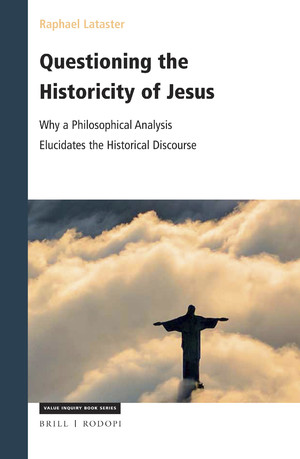The publisher Brill has forwarded me entry to Raphael Lataster's publication, Questioning the Historicity of Jesus: Why A Philosophical evaluation Elucidates the historical Discourse, for overview on this blog.
Disclaimer: Raphael Lataster makes a brief but beneficial mention of me in the booklet. i will be able to simplest plead my optimal efforts at sincere neutrality by using pointing to my important responses to one other scholar, Richard provider, who has additionally spoken positively about me.
The ebook's dedication honours the late Emeritus Professor Philip R. Davies, little doubt on account of his courageous 2012 article within the Bible and Interpretation, Did Jesus Exist?, during which he wrote
I don't feel, although, that in an extra two decades there will be a consensus that Jesus did not exist, and even probably didn't exist, but a attention that his existence isn't absolutely certain would nudge Jesus scholarship in opposition t educational respectability. (Bolding is all quotations is mine.)
A prolonged Foreword is written via Professor James Crossley who turned into a student of an anti-mythicist, Maurice Casey, but also a colleague of Philip Davies. Crossley acknowledges the contributions of outsiders from the container of biblical stories comparable to Raphael Lataster whose doctoral dissertation was in the Analytic Philosophy of religion in the religious reviews department of 1 of the world's exact fifty universities, the school of Sydney. Crossley notes that biblical studies departments have historically assumed the historicity of Jesus and that challenges to this assumption have come "from outside in contemporary years", and notes in particular of Lataster's contribution:
pondering about the challenge provided through Lataster, my take is that more scepticism is indeed necessary. (p. xii)
apparently Crossley refers to his personal selected contributions to the analyze of Christian origins and acknowledges that we can not make sure that the topics he raised (the Gospel of Mark's treatment of the sabbath, purity laws and eschatology) started with a old Jesus:
Did these issues emerge with the historical figure of Jesus? it is possible, actually. but they may have developed in (say) the 30s or 40s CE. moreover, individuals can create experiences in days, under no circumstances intellect a decade or decades. studies can additionally continue old assistance. but how can we basically prove this both manner once we've established an early way of life or theme? (pp. xii f)
observe that. Lataster, likewise, argues the agnostic place.
as a substitute of relentlessly specializing in reconstructing a person, and specific claims that can not be confirmed, we might instead turn our center of attention to a historical past of concepts in Christian origins and supply a extra strong grounding for scholarly claims. James Crossley
James Crossley Crossley isn't denying the historicity of Jesus:
As is hopefully clear, this is not a mythicist place within the sense that it doesn't disprove Jesus' existence (nor does it try to achieve this) nevertheless it is a position which acknowledges that we are severely constrained in what we can say about reconstructing the lifetime of the historical Jesus. (p. xiii)
after which makes a point I discover most reassuring myself, having tried to put it on the market frequently adequate on this blog:
but this does not need to be a nasty factor. as an alternative of relentlessly specializing in reconstructing a person, and actual claims that cannot be proven, we could in its place flip our focus to a history of ideas in Christian origins and provide a more strong grounding for scholarly claims.
This brings us to Raphael Lataster's own Introduction. i'm living on both the Foreword and Introduction in this first submit on Lataster's e-book because the question is certainly controversial adequate and misconceptions abound and want to be confronted and cleared away to ensure that a significant analyzing to occur.
 Raphael Lataster Introduction
Raphael Lataster Introduction Lataster is obvious that he's a "historic Jesus agnostic". he is not "a biblical student" however defends his tutorial credibility in addressing the question of Jesus' existence:
these advocating for ahistoricity are additionally frequently charged with now not being precise students, or at least as being students from beside the point fields. These are also technically irrelevant accurately the arguments that are scrutinised, not academic credentials. And, at the least in my case, this is untrue. I even have a PhD in spiritual experiences and teach on the heritage, sociology, and philosophy, of a variety of religions – with a tremendous focus on Christianity – at primary universities. unlike any other Jesus sceptics, i am actually no 'outsider' to the Academy. non secular experiences is a broad field that regularly contains Christian historical past or New testomony reports. Crucially, it may well also comprise, as it does primarily in my case, Analytic Philosophy of religion.eight it is worth noting that specialised old Jesus researchers are usually specialists on decrease level questions such as even if a particular saying of Jesus is probably g oing to were spoken with the aid of the actual Jesus, or no matter if it become a later fabrication.
they are generally not suitably outfitted to examine or argue for the better level subject of Jesus' very existence. The existence of the ancient Jesus is taken without any consideration by way of most New testomony specialists being pretty much paradigmatic to the field (likewise the generic veracity of the Gospels), and is commonly not argued for.9 And indeed, being comfortably paradigmatic to the field, it could appear counter-intuitive for such scholars to critically ask the query, considering that a bad influence would invalidate and nullify an awful lot of their lifestyles's work, and their future profession potentialities. ironically, it could be most reliable that these investigating the question are not New testomony experts, however are historians, classicists, analytical philosophers, and spiritual reports scholars of other specialisations. Analytical philosophers are certainly noteworthy right here for their capacity to determine inaccurate reasoning, evidently any thing of splendid improvement when inspecting the methods of mainstream old Jesus researchers.10 . . . (pp. 3 f)
certainly. Having engaged with several biblical scholars on-line about historical methods I actually have discovered the equal drawback: too regularly New testament scholars reveal a lack of attention of how historians in ancient historical past and classics departments go about establishing "what took place" during the past. James Crossley notes the "critical insights" interdisciplinary reviews can convey to the question and Lataster cites other New testament scholars (Pieter Craffert, John Gager) making the equal element.
Lataster describes the manner his own work has been got by each non-biblical and biblical historians:
A paper critiquing NT scholars' appeals to hypothetical sources:
My presentation of the paper become very successful, with virtually each person (a room full of relevant historians) agreeing with me that this formulation used by using Biblical 'historians' is absurd and not typical of historians correct. (p. 9)
A paper referring to Jesus' feasible ahistoricity:
. . . . receiving assist from even the Christians within the viewers, who felt that Christianity needn't necessarily depend on proof.
New testomony pupil, Hector Avalos:
however i'm not a Jesus mythicist, I do suppose that Lataster makes an excellent case that one cannot without difficulty push aside all types or all elements of Jesus mythicism"; and that Lataster "can be among the first to have a thesis sympathetic to Jesus Mythicism authorized through an international-category university".
other advantageous studies of Lataster's past posted arguments from Christopher Hartney and Professor Carole Cusack of the university of Sydney.
In sum,
My a success postgraduate thesis on the theme skill that it obtained the backing of as a minimum one supervisor, the pinnacle of the non secular reports department at the incredibly considered college of Sydney, and a few examiners, from different (native and overseas) universities. The suite of articles I have published means that a few referees, editors, and tutorial publishers deemed it helpful. (p. 10)
this is now not only a fringe thoughtMany ahistoricists have appropriate qualifications for this endeavour and their work on the historic Jesus (and scepticism related to Christianity) has been received through thousands and thousands, and has even attracted effective attention from different scholars.29 personally, I actually have published on this topic with Cambridge, offered on it at Oxford, and thanks to mainstream media outlets such because the BBC, the history Channel, and the Washington post, I actually have managed to reach a lot of laypersons. service has even defended his views in front of the famed Society of Biblical Literature. together, he and i have posted numerous significant peer-reviewed journal articles and books, with greater to return, and have received the support of other lecturers, including bona fide New testament scholars. here's no longer 'only a fringe thought'. (p. 10)
at the AHA conference Lataster remarks that historians there suggested him that he would be losing his time attempting to post his criticisms in journals belonging to the container of biblical reports.
clearly outsiders understand these self-styled experts very in another way from how the alleged specialists perceive themselves; definitely a salient factor. (p. 9)
regrettably Lataster fails to point out the one adult I accept as true with to be basically answerable for the present activity in the mythicist argument, Earl Doherty. It become Doherty, from around the turn of the century, who changed into behind Richard provider's initial pastime within the query and in a good deal of the scholarly outrage in opposition t "mythicism". I locate it tricky to imagine the latest controversy if Doherty had now not regarded on the scene along with his website, The Jesus Puzzle, and subsequent publications.
A Debate among Atheists Christian believers may still commonly now not get involved in this debate, nor should non-believers thrust it upon them.alas too many critics of the mythicist place count on that the motivating driver in the back of the arguments is a hostility in opposition t religion and Christianity in specific. That makes no sense to me (the worst way for any one to try to undermine an individual's religion is to deny the very existence of the figure at the centre of their faith) and it makes no experience to Raphael Lataster both, so a good deal so that he writes:
but I additionally assert that Christian believers may still often now not get entangled in this debate, nor should non-believers thrust it upon them. . . .
I have no desire to uposet Christians. (pp. 14, 15)
As for a supposedly adversarial attitude against Christianity,
I consider it evident that the idea of Jesus' mundane historicity – a privilege no longer granted to many mythological characters of other religious traditions – effectively displays the privilege of Christianity and a (now not always unearned) recognize for its influence on Western subculture and academia. (p. 23)
Christian believers, of path, greatly believe within the "Christ of religion", the one main persona within the gospels who worked miracles and the like. That isn't the Jesus being discussed by using Lataster. Most believers, Lataster notes, haven't any interest in a "old adult" of scholarly pursuit. Even Bart Ehrman is quoted as making a assisting element: that the "Jesus of history is not the Jesus of contemporary Christianity."
If one wants to address the beliefs of Christians then it's extra brilliant to address the Jesus they trust in, Lataster rightly observes.
On the rely of bias, Lataster wryly notes the acknowledgement amongst even Christian apologists like William Lane Craig that atheists will also be more important and aim than believers once they lodge to rhetoric like, "Even atheist scholars settle for . . . "
As for believing students,
it is viable, however would undoubtedly be very complex to severely and objectively query Jesus' historical existence in a single's scholarly work, when in my view believing in Jesus as now not best actual however because the centre of 1's universe. For Christians, there is clearly far more at stake – specifically, Jesus Christ. Christians may additionally no longer need to hear it, however can be unreasonable to predict that they can be completely disinterested and goal over what eventually considerations, neatly, their 'most beneficial situation'. (p. 19)
As for an atheist,
As a member of a number of oppressed corporations, I do not want to unnecessarily offend others, so i'm content material to stay open to the work of Christian scholars who argue, via methodological atheism, for the existence of the historical Jesus.
And a captivating turning of the tables with the followup remark . . . .
surprisingly sufficient, i'm yet to encounter a scholarly believer in the divine Christ of religion who argues in the proper educational channels that handiest a human Jesus existed. (p. 21)
Some ahistoricist students have found methods to reconcile their "mythicist" view of Jesus with their Christian faith and Lataster doesn't ignore these (e.g. Thomas Brodie) and attempts to reassure Christian believers greater often that the talk needn't harm their religion. in any case, the "worldly intelligent" and "methodological naturalists" hardly have the power to overturn religion anyway.
Lataster does discuss with atheists themselves have come from religious backgrounds and still have "spiritual baggage" clinging to them. most likely so. but my very own strategies have led me to accept as true with that these with such "visceral" hostility towards the questioning of Jesus' historicity for something reason have a reluctance to question "the intellectual authorities" in the box of biblical experiences. you can still keep appreciate and even deference to those that are certainly more learned than oneself in a specific area whereas actually and appropriately retaining those teachers to account to reply certainly and validly questions about their methods and conclusions.
The issueLataster elements out that the idea of the "historical Jesus" (as antagonistic to the Christ of religion) is a right away influence of the ordinary religion.
[I]t seems that Enlightenment and put up-Enlightenment scholars realised that fabulous claims are untenable, so effectively and fairly uncritically assumed that the real Jesus can be found via separating him from the greater incredible claims found in the Biblical texts. (p. 23)
in the meantime, the very existence of Jesus turned into an idea that remained assumed.
The perception within the old Jesus is thus an instantaneous final result of the present belief within the Christ of religion or Biblical/Gospel Jesus. The central questions have all the time been "What did he do?", and "What did he say?", but on no account "Did he exist?" (p. 23)
Bart Ehrman's and Maurice Casey's publications attempting to argue for the historical existence of Jesus are mentioned, together with Richard service's responses and how Raphael Lataster himself entered the discussion.
Lataster concludes his Introduction with what he believes an analytical philosophical strategy can deliver to the question. i'm reminded of my own immersion in analytical philosophy when getting to know a postgraduate route in the philosophy of education with a selected center of attention on the ameliorations between schooling and propaganda. The basic goal of the following chapters can be, it's defined, a cautious analysis of the arguments on all sides of the question. the hunt should be to try to establish old arguments which are "likely real" as distinctive from the generally inconceivable "definitely authentic" and the reasonably pointless "maybe authentic".
With the above dialogue of caveats and controversies achieved we come to chapter one. . . . .
Lataster, Raphael. 2019. Questioning the Historicity of Jesus: Why a Philosophical evaluation Elucidates the old Discourse. Leiden: Brill. https://brill.com/summary/title/54738.
the following two tabs change content material beneath. Neil is the author of this publish. To read greater about Neil, see our About web page. latest posts by using Neil Godfrey (see all) if you enjoyed this publish, please accept as true with donating to Vridar. Thanks!




No comments:
Post a Comment